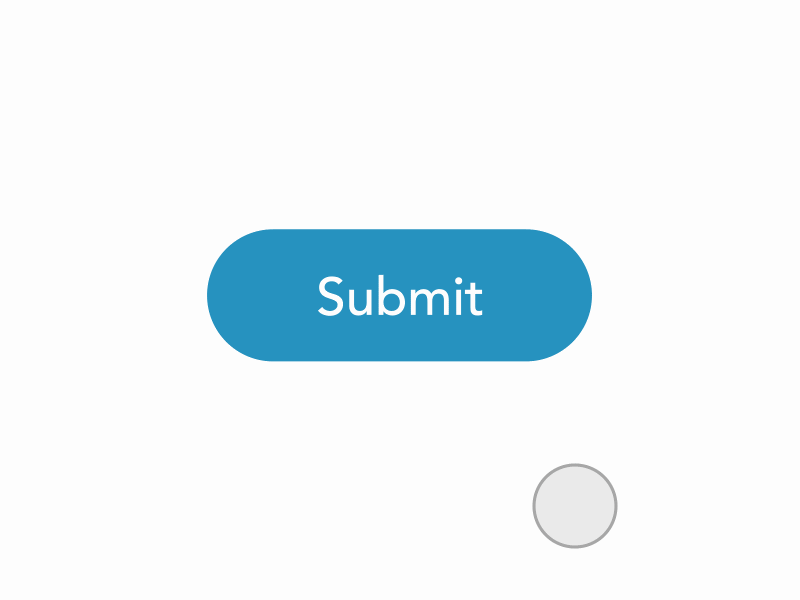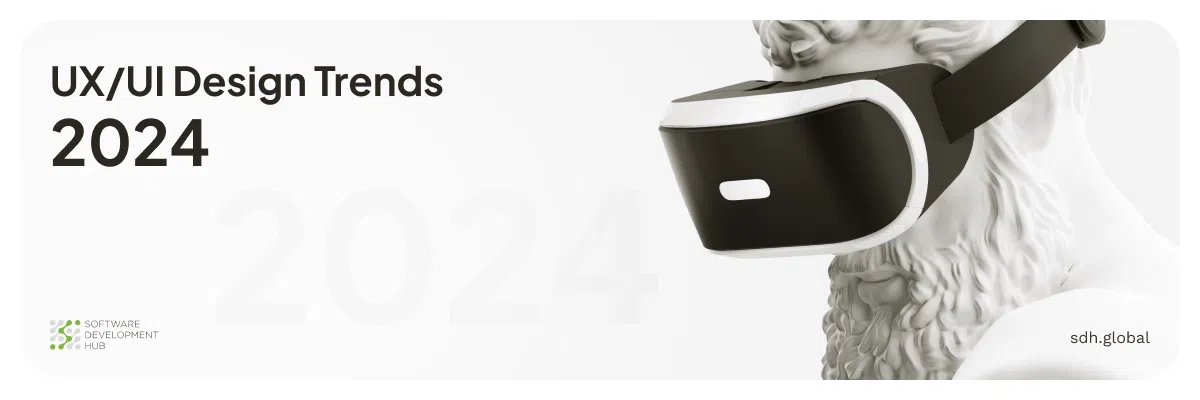UX/UI Design Trends to Watch in 2024
Importance of staying updated with the latest trends in UI/UX design
The rapid pace of technology development and constant changes in user behavioral trends make UI/UX design one of the most dynamic and important areas of the industry today. Therefore, knowledge and familiarity with the latest trends in this field is an integral part of a successful career for designers, developers, and customer-focused businesses.
Modern UI/UX design is not just a matter of visual aesthetics, it is a key tool for ensuring a satisfactory user experience. It helps to increase the usability of a product, increase its competitiveness in the market, and improve user experience. Therefore, rapid adaptation to modern requirements and user expectations, as well as following the latest design trends, helps to retain attention and attract new customers.
In this article, we will not only look at the most relevant trends in UI/UX design but also tell you why they are important for creating outstanding user interfaces and what benefits they bring to both designers and businesses in general.
Augmented Reality (AR) and Virtual Reality (VR)

For several years now, augmented reality (AR) and virtual reality (VR) have been trending. Every year, AR and VR become more accessible and powerful. This makes them more attractive for developers and designers who can create more complex and expressive interfaces, and it also makes them more attractive for businesses, as AR and VR allow them to create a more satisfying and impressive user experience. This is especially true in various industries, such as education, medicine, game design, and services. Therefore, with the development of technology, we can only expect the scope of AR and VR to increase and expand, and we should be ready to apply such solutions in projects.
Inclusiveness and accessibility of UI/UX

Invalidity is a part of human life and is an insignificant part of human experience. Approximately 1.3 million people have significant disability. That's 16% of the world's population or 1 in 6 of us. This is a significant percentage, and according to the World Health Organisation (WHO) this percentage will only continue to grow, but despite this the Web Accessibility Initiative (WAI) report notes that people with disabilities today still face various barriers when using digital interfaces. To ensure that content is accessible to people with disabilities, the WCAG set of international standards has been developed. It contains specific criteria to make web content perceivable, usable, understandable, and reliable.
Following WCAG recommendations is one of the main aspects of creating accessible UI/UX. According to these standards, the 2023 report found that 96.3% of home pages had WCAG 2 failures. This figure is a slight improvement from 96.8% in 2022. Over the past 4 years, the number of pages with detectable WCAG errors has decreased by only 1.5% from 97.8%. 96.1% of all detected errors fall into these six categories. These most common errors have remained consistent over the past 5 years. Fixing just these few types of problems will greatly improve the accessibility of the entire Internet.

In the 2023 analysis, we can see that the number of accessibility and WCAG non-compliance errors detected has slightly decreased. In certain sectors, such as public institutions and education, the situation has improved compared to other areas. As in some areas it is starting to be mandatory at the legislative level. Many countries are implementing and tightening laws and regulations that require websites and applications to meet accessibility standards. Organizations that ignore accessibility requirements can be exposed to legal risks, fines, and lawsuits. This is fuelling a growing interest in accessible design. Also, more users, businesses, and developers are becoming aware of the importance of accessibility. Social media and communities are actively discussing accessibility issues, and public pressure on organizations to make their products more accessible is increasing.
Despite progress, it still takes a significant effort to make the Internet accessible to everyone. In 2024, this will be an integral part of business strategy, not just an optional task. Providing accessible interfaces is becoming the standard, and companies that fail to adhere to it risk missing opportunities, as well as reputational and legal risks, so it is important to ensure that everyone, regardless of their ability, can access and interact effectively with websites, apps, and digital content.
Mobile-First Approach

The mobile-first approach has been a growing trend in design and development for the last few years, and it is likely to continue in the future. As of January 2023, people who use mobile devices accounted for 52.7% of all website traffic.

The number of unique mobile users is currently growing at a rate of 2.7 percent per year. At the same time, hundreds of millions of people have switched from feature phones to smartphones over the past 12 months. Therefore, based on this trend, it is safe to say that the Mobile-First trend will grow in 2024. But this does not mean that desktops are on the verge of leaving the market. Although smartphones provide more flexibility and mobility, computers and laptops are still sometimes better at handling more complex tasks. We need to pay more attention to the differences between desktops and mobile devices based on user needs.
Voice User Interfaces (VUI)

The growth in the number of voice user interfaces (voice assistants) on various devices and platforms has become a significant trend in the world of information technology. This growth in popularity is not surprising, as voice interfaces have many advantages. As a result, voice-driven user interfaces are becoming the standard, and more and more people are using voice every day to increase their usefulness, convenience, and value.
According to the report, the global voice interfaces market was valued at USD 19.73 billion in 2022 and is expected to grow at a CAGR of 23.39% between 2023 and 2028. The market size is projected to increase by USD 50,731.16 million. The market is expected to grow due to the continuous development and improvement of artificial intelligence (AI) and natural language processing (NLP) capabilities. These technologies have significantly improved the accuracy and understanding of the voice user interface (VUI).
Based on this trend and the introduction of voice assistants in many products, users will eventually expect such a feature in all applications available to them. Therefore, by focusing on statistics and user expectations, we must improve the user experience and apply it more and more.
Personalization and Customization

As technology advances, the number of users increases and competition in the market grows, it is becoming increasingly difficult to retain, let alone surprise, users. Artificial intelligence has significantly improved the ability to analyze data and user behavior. These technologies can process huge amounts of information to provide personalized content and recommendations in real-time. Therefore, users now expect a highly personalized experience across different digital platforms. They are accustomed to services such as personalized content recommendations on streaming platforms, tailored product offers on e-commerce sites, and personalized email marketing.
Personalization is a powerful strategy for the future that can transform our user experience and drive business success. By providing individualized experiences, personalized product recommendations, and relevant content, a more engaging and satisfying user experience is created.
Sustainability and Eco-Friendly Design

As our world becomes more and more aware of the environmental challenges we face, all industries are looking for innovative ways to reduce their negative impact on nature. User experience design is no exception.
As the world grapples with pressing environmental issues, including climate change and resource depletion, the relevance of sustainable UI/UX design has never been more clear and important in 2023. UI/UX design can also make an impact on the digital world by proposing and implementing steps to reduce energy consumption, minimize digital waste, and create more efficient and user-friendly experiences.
Growing awareness of environmental issues among both consumers and businesses is driving demand for green digital solutions. Consumers today are more demanding, actively looking for products and services that align with their environmental values. Energy efficiency, dark mode, optimized data, responsive design, accessibility, and overall reduction of e-waste can be good steps toward sustainable design. This combination of environmental responsibility, regulatory compliance, consumer expectations, and economic benefits underscores the continued relevance of sustainable UI/UX design in 2023 and positions it as a transformative force shaping the future of digital experiences.
Dark Mode and High Contrast Design

Dark mode has also been trending for the past few years, and for good reason. After all, dark mode on interfaces is not just about visual appeal and interface variation, it primarily improves accessibility for users with visual impairments or sensitivity to bright light through high-contrast display. Dark mode is believed to reduce eye strain and make long-screen viewing more comfortable, especially in low-light conditions.
According to surveys, 81.9 percent of smartphone users already use dark mode.
Another 82.7 percent of survey respondents claim to use dark mode with the OS.
More data shows that 64.6% of people expect websites to automatically apply dark mode.
Therefore, it is safe to say that using dark mode is becoming more popular.
Dark mode and high-contrast design are two different design concepts, although they share some common features related to improving visibility and accessibility.
High-contrast interface design refers to an approach that emphasizes sharp differences between text or interface elements and their background. It is characterized by the use of contrasting colors and brightness to visibly highlight content, increasing readability and visual clarity. It will continue to be relevant in 2024, as we have already emphasized above the increasing focus on accessibility and inclusivity of devices.
Minimalism and Simplified Interfaces

In 2023-2024, minimalism in design will go beyond aesthetics and become a holistic approach that extends to various aspects of product development and user experience. As the main trend now is user-centered design, the use of minimalist design principles is also based not on visual appeal, but on the fact that this approach can significantly increase the user's focus and improve the user experience as a whole. Minimalism prioritizes simplicity, clarity, and the removal of unnecessary elements.
Today's minimalist websites incorporate bold colors, creative typography, and subtle animations, giving them depth and visual interest while maintaining a clean aesthetic. While providing for accessibility and inclusivity by incorporating high-contrast elements, clear typography, and other accessibility elements, making interfaces more user-friendly for all users.
Microinteractions

Due to evolving technology and rising user expectations, the user expects the interface to be engaging and interactive. From pointing effects to loading animations, all of these micro-interactions contribute to a positive user experience.
Micro-interactions provide feedback to the user, often conveying information about the state of the system or helping to prevent errors. These interactions are often overlooked, yet they can have a significant impact on user engagement and satisfaction.
In 2024, expect to see an even greater emphasis on creating meaningful micro-interactions that provide instant feedback, guide the user through tasks, and add fun to their journey. These small design elements can significantly improve user satisfaction.
Oversized typography

Continuing the theme of minimalism and accessibility, the top trends for 2024 include the use of large typography in interfaces. Often we can see that in interfaces typography even replaces the use of illustrations, and if we add microinteractions, such an interface brings much more satisfaction to users.
Potential challenges and obstacles in the path of UI/UX innovation
As we head into 2024, innovation continues to evolve and gain momentum, creating both exciting opportunities and enormous challenges. Technological advances, which have always been a driving force for change in the industry, have brought new dimensions to user interfaces, including augmented reality (AR), virtual reality (VR), and artificial intelligence (AI) integrations. While these technologies have tremendous potential, their rapid development can be a challenge for UI/UX designers and developers who want to stay on the cutting edge of innovation.
One of the constant challenges is the delicate balance between personalization and user privacy. As digital products become more and more tailored to individual preferences, designers must navigate the complex area of data privacy regulations and user concerns.
Then there's accessibility, which as we've seen in UI/UX design is another key area where innovation faces obstacles. Developing inclusive interfaces that are adapted for users with different abilities requires constant attention. As the importance of accessible design becomes more and more important, the challenge is not only to comply with existing accessibility standards but also to push the boundaries to create interfaces that are universal and user-friendly.
In addition, the ever-shrinking attention span of all users today also poses a significant challenge. Designers need to find innovative ways to capture and retain users' attention among competitors. This challenge underscores the need for intuitive interfaces that seamlessly guide users through an experience, delivering value quickly and efficiently.
So, looking at the development of UI/UX innovations in 2024, it becomes clear that this area requires a holistic and adaptive approach. Designers need to be flexible, constantly learn new technologies, and be attuned to the changing expectations of users. In 2024, we have exciting, but also challenging prospects that encourage us to explore new horizons while adhering to the principles of user-centered design.
Categories
About the author
Share
Need a project estimate?
Drop us a line, and we provide you with a qualified consultation.






